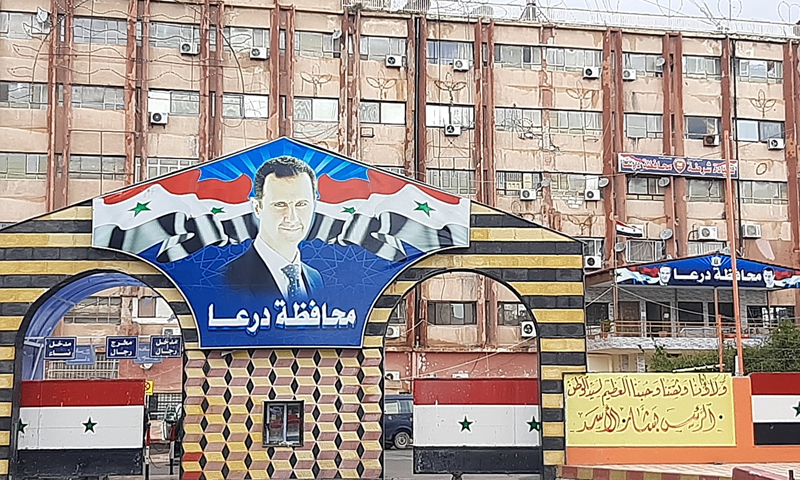



Daraa – Halim Muhammad
ِAbdul Karim served within the Syrian regime’s Ministry of Irrigation for 20 years before he stopped going to work due to his fear of being arrested at the security checkpoints during the war.
“I was not paid my salary that whole time. And now I have no hope that I can get my pension, which would help me overcome life’s challenges.”
With these words, Abdul Karim described his difficult condition, which is also the condition of thousands of dismissed state employees in Syria’s southern governorate of Daraa.
Since the Syrian regime retook control of Daraa in mid-2018, it made several promises to rehire dismissed employees. However, these repeated promises have not yet been fulfilled, disappointing those who spent years working in government bodies and who sought in these bodies a single privilege, stability of income.
In early February 2021, Daraa’s central committees asked those dismissed from their work in government departments to submit new data: full names, date and place of birth, mother’s name, date of dismissal or date of work interruption, and finally, the government institution the employee used to work with before discharge.
The central committees—which were formed after the Syrian regime recaptured control of southern Syria to negotiate the terms of the so-called settlement agreement—began receiving the dismissed employees’ documents since 8 February.
The dismissed employees submitted their papers. Now, all they can do is wait for the future to unfold, wondering how this new set of promises would look like.
After the Syrian regime regained control of the southern region, Abdul Karim submitted his documents to the Irrigation Directorate three times.
“I was denied a promotion, besides my pay, because I was unable to go for work for a long time.”
Abdul Karim thought that the settlement agreement, signed in July 2018, would make the process of returning dismissed employees to their jobs faster. But he was so far mistaken.
Said wants to go back to work in the services department, in which he spent 25 years, to get a pension, even though the sum he might get would help him to purchase only a limited range of his various needs, for it will not exceed a total of 60,000 Syrian pounds (SYP-15 USD).
A central committee member, who spoke on the condition of anonymity, told Enab Baladi that the central committees have already provided the Russian command with dismissed employees’ statistical documents “more than once.” However, the Russians have asked for new documents again.
The central committee member believes that the Syrian government’s procrastination hampers employees’ return to their work. The Russians are now talking about granting a general amnesty and a full return of dismissed employees to their work. But people should wait for actual steps, the central committee member said, indicating a lack of trust in the Russians’ repeated broken promises.
The central committees include notables, former commanders of the Free Syrian Army (FSA), and intellectuals, whose task is to negotiate with the Syrian regime and the Russian guarantor regarding the issues of detainees and defectors.
They also demanded the return of the fired employees to their work in the government departments.
There are three such committees, in Daraa’s western countryside, in Daraa city (Daraa al-Balad committee), and in Busra al-Sham town in Daraa’s eastern countryside. The committees are run by the 8th Brigade of the Fifth Corps, formed by Russia, and led by commander Ahmed al-Awda.
The dismissed teacher Hassan has submitted his name and other personal information to the committee three times without reaching the desired result. “Even though there are several job vacancies in public schools, the Directorate of Education in Daraa hired teachers who did not obtain a specialization degree.” This, consequently, harmed the performance of schools.
The dismissed teacher added that the issue of the employees’ return to work has something to do with “the Syrian regime’s political policy; The Syrian regime punishes employees who have taken a different path from its.” He added that the return of employees could only be achieved under pressure exerted by the Russians.
Suleiman al-Qarfan, the head of the Free Lawyers Syndicate in Daraa, said in a previous interview with Enab Baladi that Russians have returned to the carrot and stick policy after the failure of the intimidation policy.
Al-Qarfan added that the Syrian regime and Russia seek to rebuild confidence before the elections to be held next April. They want to polish their image before the election. He also expected that some employees will be rehired, and a few detainees will be released.
The last names of the sources are withheld for security reasons.
if you think the article contain wrong information or you have additional details Send Correction